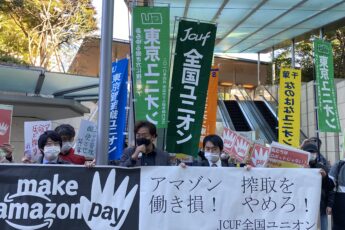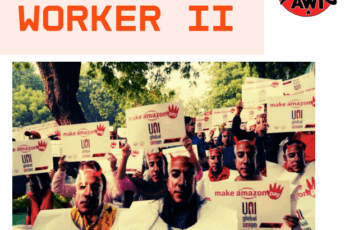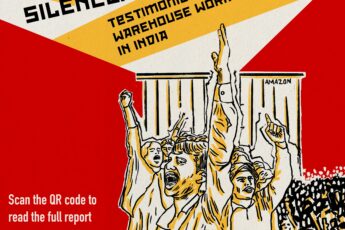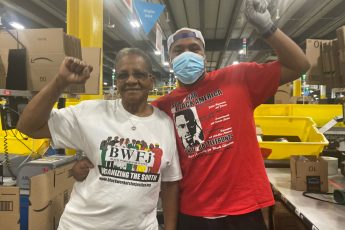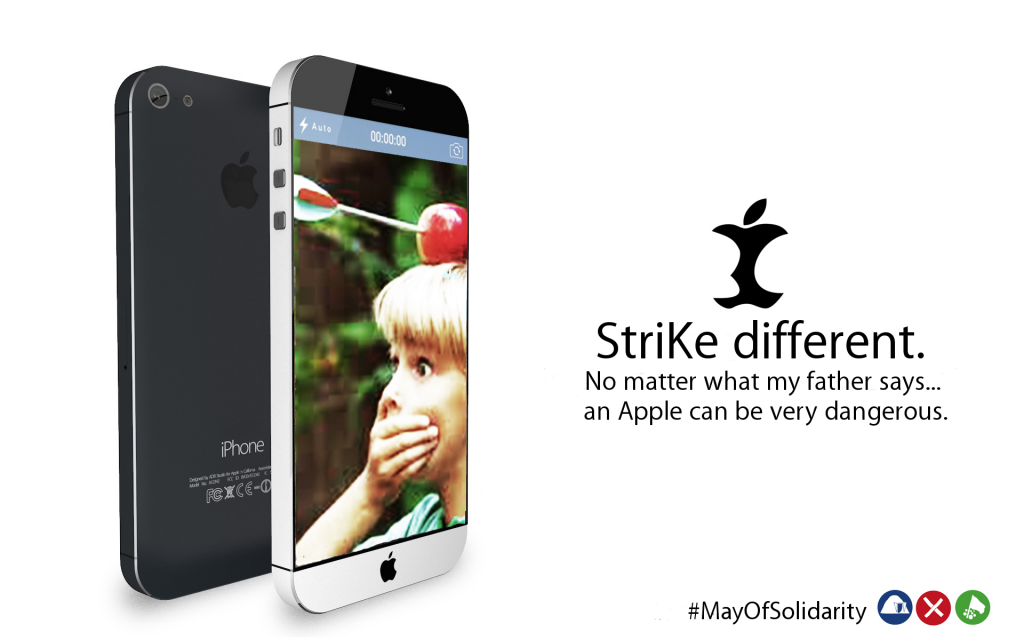
by CORK BOGUS CONTRACT WORKERS
The text we publish this Wednesday offers a cross section of a specific kind of precarity, that of freelancing, in one of the biggest multinational companies of the world and it tells us the difficulties of organizing struggles and long-lasting strategies to obtain better working conditions, both on the legal and on the political level. The article is the story of workers employed by Globetech, a Vendor company, which employs workers for Apple. The workers were given bogus employment contracts, which means that they working as employees but paid by the day, without receiving any benefits. Recounting all the attempts to get organized against the abuses of the company – passing through Unions and State department – the worker describes the intertwiningof different layers of precarization, exploitation and subordination – enforced also by harsh management control and bullying – stressing how the multinational companyuses the Vendor company to establish its own rules by getting round national law, without any consequences.This storyalso shows the way in which big companies manage to outsource all its costs and due taxes to the workers, while practically depriving the law of any concrete meaning, something that recalls the case of the workers in the gig economy.This double level of control and abuse, strengthened by the threat and the actual use of unjustified dismissal, makesit very difficult for workers to run the risk of getting organized, because it convinces them they have no chance to win. The importance of this analysis lies therefore on two main axes: on the one hand workers’ struggle cannot count on the power of the law or the Union, on the other, consequently, the article shows the crucial need for new forms of organization capable of creating the conditions for the workers to fight. Since the workers’ fight against a transnational organization of production, their struggles must be organized on that level as well. A transnational connection among the workers could in fact give more power to the struggles also on the local level.
I used to wonder, many years ago, why so many multinational companies, had based their European Headquarters in Ireland. After working for an Apple project for a few years I can confidently say I have the answer.
When I started working for Apple, through a vendor company called Globetech, I washired as a contractor, which basically means being a freelancer. However, unlike a freelancer, I was expected to be in the office before 10 every day, stay for 8 hours, regardless if my work was completed earlier or not, clock in and out and being under the control of an Apple manager, who directed me how, when and where my work had to be done. What this means according to the Irish Labour Law is that I was working as an employee and not as a self-employed contractor. I later found out that the contract I signed wasa bogus employment contract. I was being paid by the day, if I went to work that is. If I did not, I was not entitled to paid sick days or holidays.I was also responsible for paying taxes on my own, and the company did not pay the PRSI (Pay Related Social Insurance).The total amount this arrangement cost me per year was around 6.000€. The initial team consisted of 60 people, so the total profit the company made in a year due to these contracts was around 360.000€. I was a contractor for more than 2 years years and so were most of my colleagues. Also, another 60 people were hired as the project grew, so it is obvious that the company’s profit was enormous.
Our Odyssey began in 2016 when we found out, through the Revenue Office, that the contracts we had signed were bogus. Until then we never questioned them because we trusted that the company did everything by the book.We immediately started self-organizing and turned to the Unions for support and legal guidance. The Communications Workers Union told us that they could not deal with issues that arose before we became members, so in essence they rejected us. Unite the Union or Unite told us we were better off with a local Union in Cork called Independent Workers Union or IWU. The IWU told us that they would file complaints against the company with the Workplace Relations Commission. They were really enthusiastic at first and we put all our trust in them but after a few months we realized that they had not filed the complaints for all of us and that their enthusiasm was short lived. They gradually showed how little they really cared and how little they were really prepared to do for us.

At the same time we turned to the Scope Section of the Department of Social Protection. The functions of Scope Section are to investigate the legitimacy of the contracts, and decide whether or not workers were indeed self-employed or employees. The excuses they used in order to avoid investigating Globetech, were that they were understaffed and that the company had been investigated in the past and thus it could not be investigated again. However, they refused to give us the ruling of the previous investigation. We decided to go public and one of my colleagues gave a radio interview, for a local station, where she talked about the bogus contracts and an article was written for the Irish Examiner. Scope Section then proceeded with the investigation, but only interviewed two colleagues and not all of us. We were told that they will base their decision for the rest of us on the outcome of the investigations of those two colleagues. It has been nine months and we still don’t have a decision. It was also at that time, that the company, due to the bad publicity that involved Apple as well, started to offer fixed term employment contracts to most of the contractors.
What we found out after a while was that Scope Section would just make a decision, if we were in fact working as employees or not and if they decided that we were, they would change our status in the Revenue Office System. They had no power to award any sort of compensation. The Workplace Relations Commission was in charge of that. It took almost half a year for our cases to be brought before an adjudicator and when they did we found out that many of the decisions were just recommendations and thus not legally binding for the company. In these proceedings, the adjudicator would accept the fact that the company had indeed defrauded the Irish State, by not paying PRSI, and had denied us of the benefits, but they would neither punish them nor award us with compensationequal to the amount the company actually owned us.
Also, during this period the company became more and more brutal. The insane level of micromanagement and the constant bullying forced two of my colleagues who would speak up to quit. The Apple managers, who had pending bullying claims against them, claims that were never investigated by the company, were allowed to promote anyone they wanted and fire people they did not like. People were punished and were put on evaluation randomly, and Globetech refused to provide an evaluation process that would ensure equality. The micromanagement level has reached such a level that workers are expected to work continuously and if they fail to comply they will be dismissed.Nowadays, workers do not take toilet breaks and they skip their lunch in order to meet this new requirement.
Last but not least, the fixed term contracts that were given to the employees will expire in March 2017. Their positions are already advertised on the company’s website for 8000€ less per year. Having seen how people who spoke up were treated, employees nowadays rarely object to what is going on or take any action to change the situation. During all this time, the name of Apple did not appear in any legal proceedings. The Vendor company, in their effort to please their client (Apple) and not lose the contract with them, is willing to do whatever it takes, no matter how illegal or immoral, disregarding the fact that there are human lives they ruin along the way.
So, to return to my initial question, why do so many multinational companies come to Ireland? They come because they realize that they can get away with things they wouldn’t be able to get away with elsewhere. The law is seen as a recommendation and when it is enforced it is a slap on the wrist. There are no real repercussions when the companies decide to not follow the law and there is a maze awaiting the employees who decide to fight for their rights through the legal system.
We keep fighting these bogus employment contracts because if nobody speaks up they will become the norm. And we know first handed that there are devastating consequences that come with them. Just imagine not being able to go on vacation, having to worry if you will be able afford to pay the rent in case you got sick or injured, and not being able to organize your life. The law is there for a reason and since the politicians and the judges are not quick to enforce it, it has become our duty to stand up against companies like Globetech and Apple..


